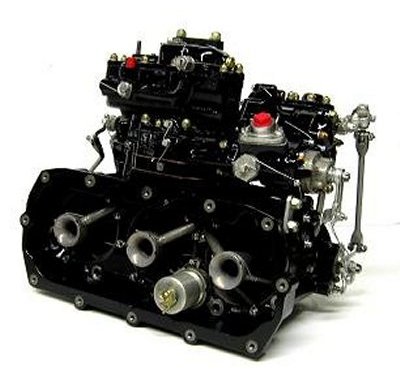
A Brief History of Aircraft Carburetors and Fuel Systems
Part 8: Bendix-Stromberg Pressure Carburetors
by Terry Welshans
Bardstown, Kentucky
for the Aircraft Engine Historical Society
Published Aug 2013; Revised 20 Mar 2018
Table of Contents
The Bendix-Stromberg pressure carburetor is a more or less conventional carburetor design in most respects, in that all of the air and fuel control systems are present, but in a modified form. The fuel within the carburetor is always under pressure from its entry into the fuel regulator until sprayed into the airflow past the throttle or into the eye of the supercharger. Like the float-type carburetor, this carburetor is available in downdraft and updraft designs. There is a small horizontal model available for engines requiring this design, which mount vertically in small helicopters.
 |
| Fig. 80. Bendix-Stromberg PT-13G1 Pressure Injection Carburetor (Top View) Used on Pratt & Whitney R-2800 Engines |
Connected to this airflow sensor diaphragm is a fuel pressure regulator diaphragm that holds a constant fuel pressure in the fuel discharge piping, the flow rate being determined by the position of the air sensor diaphragm.
The throttle is located in the air stream after the air has passed through the venturi. It was possible to discharge the fuel at any location beyond the throttle, thus greatly diminishing the throttle icing. The carburetor has one or more fixed venturis, thereby avoiding compressibility difficulties experienced in the Chandler-Groves carburetor when the variable-venturi throttle was in cruise power at high altitude.
Wright Aeronautical received a prototype of the new Stromberg floatless carburetor setup for the Cyclone 9 engine, and engineers immediately began to work as intensively on its development as they had on Chandler-Groves carburetor development. Sometime later a prototype for a Pratt & Whitney Twin-Wasp engine was ready. Pratt & Whitney had disliked the Chandler-Groves design and had provided only minimal assistance with its development. P & W approved the new Stromberg design, and like Wright, did a great deal of work toward its development. The new Stromberg floatless carburetor was in production in 1938, and was an immediate success. Like the Chandler-Groves carburetor, it was free from float problems, and was much less prone to icing than the float-type carburetor. The Stromberg automatic mixture control was sound in principle, and although it was not working perfectly in 1938, by 1940 it was completely satisfactory.
Pratt & Whitney adopted the Stromberg floatless carburetor for all of its high-power engines. It also was used by the Army on all the Wright G-200 Cyclones that powered Boeing's B-17. Pratt & Whitney later developed a system where fuel sprayed into the supercharger inlet instead of immediately after the carburetor, and with that change, fuel refrigeration icing problem no longer existed.
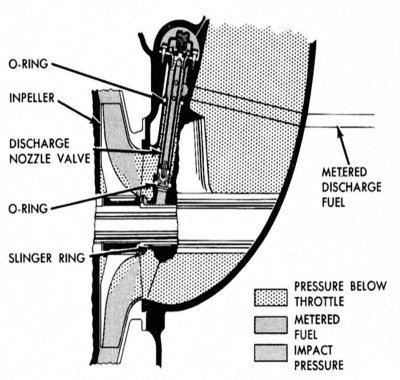 |
| Fig. 81. Bendix-Stromberg Fuel Delivery Nozzle |
Design and Development
The new Bendix floatless carburetor design replaced the float-operated fuel inlet valve with a servo-operated poppet-style fuel-metering valve. There are either one or two small vent floats in the fuel regulator air bleed system. These floats have nothing to do with the air-fuel ratio, as their only purpose is to allow any air trapped in the fuel regulator to return to the fuel tank where it vents to the atmosphere.
Components
Throttle Body
The throttle body is the main portion of the carburetor. It contains one or more bores through which all of the air flows into the engine. Each bore contains one or two throttle plates to control airflow into the engine. Downdraft carburetors are used on R-1300, V-1710, R-1820, R-1830, R-2000, R-2600, R-2800, R-3350 and R-4360 engines. Other Bendix Stromberg carburetors are updraft designs used on V-1650 engines.
All remaining main portions attach to the throttle body, where they interconnect with internal passages or external tubes or hoses. The boost bar portion measures air density, barometric pressure, and the amount of air flowing through the carburetor. Bendix-Stromberg carburetors use a double or boost type venturi developed and patented for automobile carburetors. Obtaining the vacuum used by the fuel flow control valve from a smaller boost venturi resulted in a reduction of air pressure losses. This portion mounts in the airflow at the carburetor inlet. The automatic mixture control, if used, is mounted either on the boost portion for a throttle body with two or more throats, or on the throttle body itself for single throat models. The throttle body may have an adaptor bolted to the carburetor base that changes airflow direction. This adaptor may have the fuel discharge nozzle and accelerator pump attached to it. Small aircraft engines can be equipped with a single throat pressure carburetor. This carburetor throttle body contains all of the other components listed above.
Fuel Control
The pilot operates the fuel control to adjust fuel flow into the engine. The fuel control contains a number of jets that control internal fuel pressures. The idle valve and its operating lever and adjustable linkage are visible at the lower part of Figure 86.
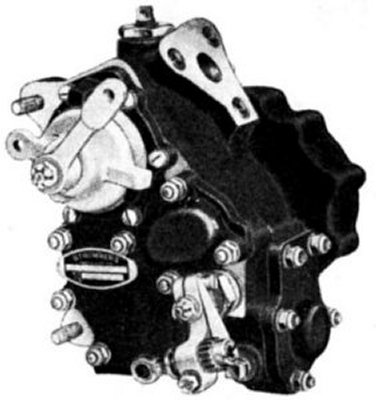 |
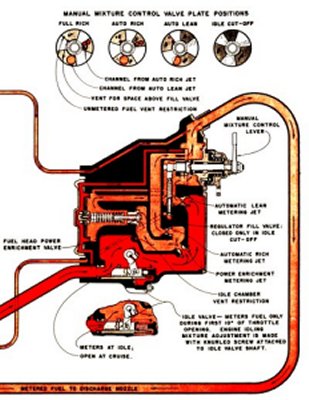 |
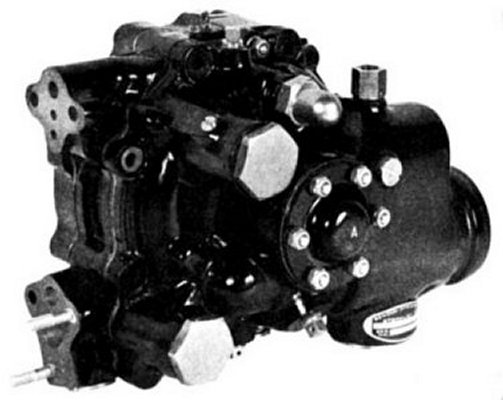 |
| Fig. 86. Bendix-Stromberg Carburetor Fuel Control | Fig. 87. Bendix Stromberg Injection Carburetor Fuel Control | Fig. 88. Bendix-Stromberg Carburetor Fuel Regulator |
Fuel Regulator
This is the "brain" of the carburetor. Movement of a diaphragm that measures engine mass airflow adjusts the position of the fuel-metering valve accordingly, and controls the fuel flow rate. The poppet-type metering valve is located under the round cover retained by six studs and nuts (Fig. 88).
Description
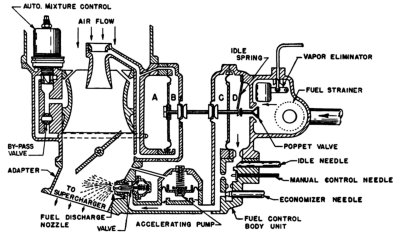 |
| Fig. 89. Bendix-Stromberg Pressure Carburetor Schematic |
Four main chambers comprise the Bendix-Stromberg fuel regulator. The air diaphragm separates the "A" and "B" chambers, which are closest to the throttle body. Chamber "A" contains the pressure from the impact tubes. Chamber "B" contains the suction from the boost venturi. The difference in pressure between the two air chambers creates the air metering force. The fuel-metering diaphragm separates the "C" and "D" chambers, which are located outboard on the same valve stem as the air-metering diaphragm. Chamber "C" contains "metered fuel" (fuel that has already passed through the jets, but not yet injected into the air stream); chamber "D" contains "unmetered fuel" (the fuel as it enters the carburetor). A fuel pressure drop results as the fuel flows through the jets and into chamber "C". The reduced pressure in chamber "C", on one side of the fuel diaphragm, and unmetered fuel at fuel pump pressure in chamber "D", on the other side of the diaphragm, create the fuel metering force.
The fuel-metering valve is located at the outboard end of the valve stem, and responds to the total pressure differential across the air and fuel diaphragms. The resulting valve stem movement controls fuel flow into the engine under all flight conditions by slightly opening or closing the fuel-metering valve as necessary.
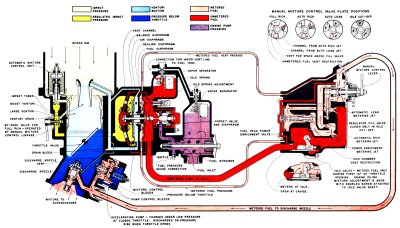 |
| Fig. 90. Bendix Stromberg Downdraft Pressure Carburetor |
Operation
The regulator is a diaphragm-controlled unit divided into four primary chambers. Two regulating diaphragms separate the primary chambers from one another. Secondary balancing diaphragms compensate for differences in diaphragm areas caused by the valve stem and the poppet valve assembly. Chamber "A"contains regulated air scoop pressure; chamber "B" contains boost venturi pressure; chamber "C" contains regulated fuel pressure; chamber "D" contains unregulated fuel pressure. Refer to Figure 90 , and assume that for a given airflow (measured in in pounds per hour through the throttle body and venturi), a negative pressure of 0.25 psi is established in chamber "B". This tends to move the diaphragm assembly and the poppet valve in a direction to open the poppet valve, permitting more fuel to enter chamber "D", while the pressure in chamber "C" is held constant at 5 psi (10 psi on some installations) by the spring-loaded discharge nozzle or impeller fuel feed valve. Hence, the diaphragm assembly and poppet valve will move in the open direction until the pressure in chamber "D" is 5.25 psi. Under these pressures, there is a balanced condition of the diaphragm assembly with a pressure drop of 0.25 psi across the jets in the fuel control unit. In the event the nozzle pressure (chamber "C" pressure) rises to 5.5 psi, the diaphragm assembly balance will be upset and the diaphragm assembly will move to open the poppet valve so as to establish the necessary 0.25-psi pressure in chamber "D" and, thus, re-establish the 0.25-psi differential between chamber "C" and chamber "D". Hence, the drop across the metering jets will remain the same.
If the fuel inlet pressure is increased or decreased, the fuel flow into chamber "D" will tend to increase or decrease with the pressure change, causing the chamber "D" pressure to do likewise. This cycle will again upset the balanced condition previously established, and the poppet valve and diaphragm assembly will respond by moving to increase or decrease the flow to re-establish the same pressure differential established between chambers "C" and "D" as the 0.25-psi differential established between chambers "A" and "B".
Fuel flow changes when the mixture control plates move from the auto-lean to auto-rich or vice versa, thereby selecting a different set of jets or cutting one or two in or out of the system. A mixture position change causes the diaphragm and poppet valve assembly to reposition, maintaining the established pressure differential of 0.25 psi between chamber "C" and "D", maintaining the established differential across the jets.
Under low-power settings (low airflow), the difference in pressure created by the boost venturi is not sufficient to accomplish consistent regulation of the fuel. Hence, an idle spring is located in chamber D (Fig. 90). The poppet valve moves toward the closed position until it contacts the idle spring. The spring holds the poppet valve off its seat far enough to provide more fuel than is needed for idling. This potentially over-rich mixture is regulated by the idle valve. At idling speed, the idle valve restricts the flow to the proper amount, but at higher speeds, it is withdrawn from the fuel passage and has no metering effect.
The fuel delivery nozzle is either remotely mounted at the "eye" of the engine's supercharger or in the carburetor adapter after the carburetor body. The fuel sprays into the air stream as it enters the engine through one or more spring-controlled spray valves. The spray valves open or close as the fuel flow changes, holding a constant fuel delivery pressure.
An accelerator pump injects a measured amount of extra fuel into the air stream to allow smooth engine acceleration, and is either remotely mounted or mounts on the carburetor body. The accelerator pump is either mechanically connected to the throttle, or it is operated by sensing the manifold pressure change when the throttle is opened.
Some carburetors may have an optional anti-detonation injection (ADI) system. This carburetor modification consists of a "derichment valve" located in the fuel control, a storage tank for the ADI fluid, a pump, a regulator that provides a specific amount of ADI fluid based on the fuel flow, and a spray nozzle that is mounted in the air stream entering the supercharger.
Variants
Bendix-Stromberg produced a number of floatless carburetor styles and sizes, each calibrated to a specific engine and airframe. Each carburetor model number includes the style, size and a specific model letter,sometimes followed by a revision number. Each application (the specific engine and airframe combination) then receives a "list number" that contains a list of the specific parts and flow sheet for that application. There are hundreds of parts list and flow sheets in the master catalog. Bendix used a special method to identify round carburetor bores as found in the PS, PD and PT models. The first inch of bore diameter is the base number one, and each 0.25" increase in diameter adds one to the base number.
The actual finished bore size is 3/16 inch larger than the coded size.
Applications
| Model | Engine | Aircraft |
|---|---|---|
| PS-5B | Continental E-165, E-185 | |
| PS-5BD | ||
| PS-5C | O-405-9 | |
| PS-5CD | ||
| PSD-5C | ||
| PSH-5CD | ||
| PD-7A1 | R-985B | |
| PS-7BD | ||
| PSD-7BD | ||
| PSH-7BD | ||
| PM-8A1 | Ranger V-770-D1 | |
| PM-8A2 | Ranger V-770-D4 | |
| PM-8A3 | Ranger V-770-D1 | |
| QM-8A1 | Ranger V-770-D4 | |
| QM-8A2 | Ranger V-770-D1 | |
| PD-9C1 | R-1535-94, -96 | |
| PD-9C2 | R-1535-94, -96 | |
| PD-9D1 | R-1535-2, -92, -96 | Chance Vought SBU-3, SB2U-1, -2, -3 |
| R-1340-36 | Curtiss SOC-4, North American SNJ-2, -3 | |
| PD-9E1 | R-1300 | |
| PD-9E2 | R-1300 | |
| PD-9F1 | R-1300-C7 | |
| R-1300-1A, -1B, -2A, -4A | North American T-28A, PG-1, -2, -2W | |
| R-1300-1 | ||
| R-1300-957C7RA1, -C7BA, -2, -2A, -2B | ||
| PD-9F2 | R-1300 | |
| PD-9G1 | R-1300-3 | Sikorski HRS-3, HO4S-3, H-19B, D, UH-19 |
| R-1300-3, -3A, -3B | Sikorski HRS-3, HO4S-3, H-19B, D, UH-19 | |
| R-1300-3, -3C, -3D | Sikorski HRS-3, HO4S-3, H-19B | |
| R-1300-990C7BA1, R-1820-76A, -76B | Sikorski S-55 | |
| QD-9A1 | Ranger V-770-C1 | |
| QD-9A2 | Ranger V-770-6, -8, -11 | Curtiss SO3C-3 |
| P & W R-1340-AN-1 | ||
| QD-9A3 | Continental R-975-9A, -34 | |
| QD-9A4 | Continental R-97S-34 | |
| Continental R-975-34, -42, -46 | Piasecki HUP-1, -2, -3, H-25A | |
| QD-9B1 | Ranger V-770-C1B-11 | |
| QD-9Cl | Continental R-975-9A | |
| QD-9D1 | Continental R-975-34, -42, -46, -46A | |
| QS-9A1 | Menasco D6F-G | |
| AS-12A1 | R-1340 | Piasecki HUP-2, -3, H-25A |
| PD-12B3 | ||
| PD-12B4 | V-1710-21 (C10) | Curtiss YP-37, P-37 |
| V-1710-23 (D2) | Bell YFM-1, FM-1, -1A | |
| R-2180-5, -7 | Stearman XA-21 | |
| PD-12B5 | R-1820-G200 | |
| R-1820-F53 | ||
| R-1820-G102 | ||
| R-2600 | ||
| R-1830-SICG | ||
| PD-12B6 | R-2180 | |
| V-1710-21 (C10) | Curtiss YP-37, P-37 | |
| V-1710-23 (D2) | Bell YFM-1, FM-1, -1A | |
| R-1830-21 | Douglas C-41 | |
| R-1830-S1CG, -SCG | Douglas DC-3, C-41 | |
| PD-12B7 | R-1820-G10, -G102 | |
| R-1820-G102A, -79, -81, -83 | Douglas C-50B, C, D, C-51, Lockheed Hudson I, II | |
| R-1820-G200, -G202A, -G205B, -71, -91 | Douglas C-49A, B, C, D | |
| PD-12B8 | R-1830-SC3G | Douglas DC-3 |
| R-1830-S1C3G | Douglas C-48B, C | |
| R-1830-SC3G, -45 | Douglas DC-3, Curtiss P-36 | |
| R-1830-SC3G | Douglas DC-3, Republic P-43 | |
| R-1830-49 | Lockheed A-28, Republic RP-43A, B, C | |
| PD-12B8E | R-1830-S1C3G | Douglas C-48B, C |
| PD-12E1 | R-1830-76 | Grumman XF4F-3, -4, F4F-3 |
| R-1830-76, -78, -88 | Consolidated PB2Y-2, -3, Grumman XF4F-3, -4, F4F-3 | |
| PD-12E2 | R-1830-76, -86 | Grumman F4F-3, -4, -7, Eastern FM-1 |
| PD-12E3 | R-1830-76, -78, -88 | Consolidated PB2Y-2, -3, Grumman XF4F-3, -4, F4F-3 |
| PD-12E4 | R-1830-76, -86 | Grumman F4F-3, Eastern FM-1 |
| PD-12F2 | R-1830-C4, -C5 | |
| R-1830-43 | Consolidated B-24D, E, H, B-25C | |
| R-1830-S3C4G | Douglas DC-3C | |
| R-1830-33, -41, -43, -57 | Consolidated XB-24, RB-24, B-24A, B, C, D, E, PB3Y-3, Martin RB-10B, Lockheed A-28A | |
| R-1830-S4C4G | Douglas DC-3C, Lockheed 18-14 | |
| R-1830-67 | Douglas C-47, C-48, C-52, Lockheed PBO-1, RA-28A, C-57 | |
| R-1830-S3C4G | Douglas DC-3C | |
| R-1830-90 | Grumman F4F-3A, -4A, -6, G-36B | |
| R-1830-39 | ||
| R-1830-43,-47 | Consolidated B-24, Republic P-34D | |
| R-1830-S1C3G, -S3C4G | Douglas DC-3C, C-48, C-52, Lockheed C-57 | |
| R-1830-41, -43, -55 | Consolidated B-24 | |
| R-1830-90B | Douglas C-47B, Bristol Beaufort II | |
| PD-12F3 | R-2000-D, -DG-1, -3 | |
| R-2000-1, -3, -7 | Douglas C-54A, B, C, F | |
| PD-12F4 | R-1830 | |
| PD-12F5 | R-1830-90B, -90C, -90D | Douglas DC-3, C-47B, D, C-117B, R4D-6, -7 |
| R-1830-41, -43, -45, -55 | Consolidated RB-24C, B-24B, C, D, E, PB4Y-1 | |
| R-1830-67 | Douglas C-47, C-48, C-52, Lockheed PBO-1, RA-28A, C-57 | |
| Jacobs XR-1530 | ||
| R-1830-90B, -90C, -90D | Douglas C-47B, C-47D; C-117B; R4D-6, -7; DC-3D | |
| R-1830-43 | Douglas DC-3C | |
| R-1830-S3C4G | ||
| R-1830-90C | ||
| PD-12F6 | R-2000-1, -3, -7 | Douglas C-54A,B,C,F, DC-4 |
| PD-12F7 | R-2000-3, -7 | Douglas C-54A, R5D-1, DC-4 |
| R-1830-94 | Consolidated P4Y-2, Douglas DC-3 | |
| R-1830-94, R-2000-3, -7, -11, -7M2, -DS5 | Douglas DC-4, C-54, de Havilland DHC-4, CV-2B | |
| R-2000-5, R-1830-75, R-2000-11 | ||
| PD-12F8 | R-1830-75 | Douglas DC-3, Ford XB-24N, B-24N, XB-24K |
| R-1830-98 | Consolidated P4Y-2 | |
| R-2000-D1G, -D13G, R-2000-9,-13 | ||
| R-2000-9, -13, -2SD1G, -2SD13G | Douglas C-54, R5D | |
| R-2000-D5 | ||
| PD-12F9 | R-1830-43 | |
| PD-12F10 | R-1830-C4 | |
| PD-12F11 | R-2000-9 | |
| PD-12F12 | R-1830-98 | |
| PD-12F13 | R-2000-4, -9, -13 | Douglas R5D-2, -3, -4R, -5, -5R |
| R-2000-4, -9, -11, -7M2, -13 | Douglas C-54, C-47, de Havilland DHC-4, C-7A, CV-2B | |
| R-2000-2SD1G, -2SD13G | Douglas DC-4 | |
| R-1830-75 | Douglas DC-3, Lockheed C-57 | |
| PD-12F14 | ||
| PD-12G1 | V-1710-27 (F2R), -29 (F2L), -49 (F5R), -53 (F5L), V-1710 -35 (E4), -37 (E5) | Lockheed YP-38, P-38D, E, F, F-1, F-5, F-10 |
| PD-12H1 | R-1830 (S1C3-G) | |
| R-1830-66 | Consolidated PBY-3 | |
| R-1830-72 | Consolidated XPB2Y-1, XPBY-5A, PBY-4 | |
| R-1830-82 | Consolidated PBY-5,-5A, Douglas R4D-1 | |
| R-1830-84A | Lockheed R5O-3, | |
| R-1830-92 | Boeing PB2B-1,-2, Budd RB-1, Curtiss YC-76A, Lockheed C-54D, Consolidated PB2Y-3, -3R, -5, -5R, -5H, -5Z, PBY-5, -5A, -5B, Consolidated PBY-6, -6A, OA-10, NAS PBN-1, Sikorski JR2S-1, Douglas C-47A, C, R4D-1, -3, -4, -5, C-48A, C-53A, B, C, D, C-68, DC-3C, Vickers PBV-1A, OA-10A | |
| R-1830-66, -82 | Consolidated PBY-3, -5, -5A, Douglas R4D-1 | |
| R-1830-S1C3G-53 | Douglas DC-3C, C-48B, C | |
| R-1830-82,-88 | Consolidated PBY, Douglas C-48, C-52, Brewster OA-10 | |
| R-1830-74 | ||
| R-1830-57 | Republic P-43A, AT-12, Seversky P-35A | |
| PD-12H2 | R-1820-G200 | |
| R-1820-50, -65, -73, -87, -91, -97, -G200 | Boeing B-17C, D, E, F, G | |
| PD-12H3 | R-1820-G249, -G205B, -G202A | |
| R-1820-G205A, -G202A, -71, -87 | Douglas C-49A, B, C, D, Boeing B-17C, D, E, F, Lockheed PBO-1 | |
| R-1820-40, -42 | Brewster F2A-2, -3, Lockheed R5O-4, -5 | |
| R-1820-67, -69 | ||
| R-1820-G200, -G202A, -G205A, -40, -42, -87, -93 | Boeing B-17C, D, E, F, Lockheed PBO-1, Hudson III | |
| R-1820-G205A, -G105A | Douglas DC-3 | |
| R-1820-G205 | Northrop N3PB | |
| R-1820-G205A, -G202A, -54, -87 | Douglas DC-3, R4D-2, C-49, Lockheed PBO-1, R5O-6, Grumman F2F-6 | |
| R-1820-G205A, -87 | Douglas DC-3, C-49A, B, C, D | |
| R-1820-G | ||
| PD-12H4 | R-1830-66, C3 | Consolidated PBY-3 |
| R-1830-72 | Consolidated XPB2Y-1, XPBY-5A, PBY-4 | |
| R-1830-82 | Consolidated PBY-5, -5A, Douglas R4D-1 | |
| R-1830-92 | Boeing PB2B-1, -2, Budd RB-1, Curtiss YC-76A, Lockheed C-54D, Consolidated PB2Y-3, -3R, -5, -5R, -5H, -5Z, PBY-5, -5A, -5B, Consolidated PBY-6, -6A, OA-10, NAS PBN-1, Sikorski JR2S-1, Douglas C-47A, C, R4D-1, -3, -4, -5, C-48A, C-53A, B, C, D, C-68, DC-3C, Vickers PBV-1A, OA10A | |
| R-1830-90,-S1C3G | Douglas DC-3 | |
| R-1830-S1C3G | Douglas DC-3C, C-48B, C, C-52A, B, C, D, Lockheed C-57A, B | |
| R-1830-66 | Consolidated PBY3 | |
| R-1830-92A | Consolidated PBY-5A | |
| R-1830-S1C3G-53 | Douglas DC-3 | |
| PD-12H5 | R-1820-50, -65 | Boeing B-17C, D, E, F |
| PD-12H6 | R-1820-G205 | |
| PD-12H7 | R-1830-C3, -66, -72 | |
| PD-12J1 | R-2600-3 | Douglas B-23, C-67 |
| R-1820-G102 | ||
| R-2600-A, -3, -11 | Douglas A-20B, C, P-70 | |
| R-2600-11 | Douglas BD-2, A-20A, B, C, B-23, C-67, P-70 | |
| PD-12J2 | PACKARD MARINE | |
| PD-12J3 | R-2600-11 | Douglas A-20C |
| PD-12K1 | R-2600-3 | Douglas B-23, C-67 |
| R-2600-23 | Douglas A-20C, G | |
| Continental IV-1430 | ||
| PD-12K2 | V-1710-35 (E4) | Curtiss P-40, Bell P-39C, D, D-1, E, F, J, K, L |
| V-1710-37 (E5) | Bell YP-39, P-39 | |
| V-1710-39 (F3R) | Curtiss P-40D, E, E-1, M, N, North American P-51A, Republic XP-47 | |
| V-1710-51 (F10R) | Lockheed P-38E, H, P-49; Bell P-39 | |
| V-1710-63 (E6) | Bell P-39D-2-BE, K, K-1-Bell-1-BE, M | |
| V-1710-73 (F4R) | Curtiss P-40E, K, North American P-51A | |
| V-1710-27 (F2R), -29 (F2L), -81, -99 (F26R), -115, -81, -99 (F26R) | ||
| PD-12K3 | V-1710-51 (F10R) | Bell P-39, Lockheed P-38E, G1, G2, H, P-49 |
| V-1710-55 (F10L) | Lockheed P-38E, G1, G2, H | |
| V-1710-89 (F17R), - 91 (F17L) | Lockheed P-38E, H | |
| PD-12K4 | R-1820-56, -60 | Eastern FM-2, Douglas SBD-5, -6 |
| PD-12K5 | R-2600-A5B | |
| PD-12K6 | V-1710-39 (F3R) | Bell P-39D, N |
| V-1710-63 (E6) | Bell P-39D-2-BE, K, K-1-BE, L, L-1-BE, H, P-76 | |
| V-1710-67 (E8) | Bell P-39M, P-76 | |
| V-1710-75/77 | ||
| V-1710-81 (F20R) | Curtiss P-40M, N, North American P-51A | |
| V-1710-83 (E18) | Bell P-39M-1-BE | |
| V-1710-85 (E19) | Bell P-39N-l-BE, P-39Q-1-BE | |
| V-1710-99 (F26R) | Curtiss P-40N | |
| V-1710-55 (F10L) | Lockheed P-38E, H | |
| PD-12K7 | V-1710-55 (F10L), -89 (F17R), -91 (F17L) | |
| V-1710- | Bell P-39 | |
| V-1710-51 (F10R) | Lockheed P-38E, H, G1, G2, P-49 | |
| V-1710-55 (F10L) | Lockheed P-38E, H, G1, G2 | |
| V-1710-87 (F21R) | North American A-36A-l | |
| V-1710-89 (F17R), -91 (F17L) | Lockheed P-38N | |
| V-1710-111 (F30R), -113 (F30L) | Lockheed P-38L, M | |
| V-1710-73, -89(F17R) | ||
| PD-12K8 | V-1710-109 (E22), -111 (F30R), -113 (F30L) | |
| V-1710-115 (F31R) | Bell P-63 | |
| V-1710-109 (E22), -111 (F30R), -113 (F30L) | Lockheed P-38K, L, M | |
| V-1710-F27 | ||
| PD-12K9 | V-1710-129 (E23) | |
| PD-12K10 | R-1820-C9HD, -93 | |
| R-1820-56 | Lockheed C-56, Pac-Aero Learstar, CASA-202B | |
| R-1820-G205A, 736C9GC | ||
| PD-12K11 | Sterling Experimental (Marine) | |
| PD-12K12 | V-1710-109(E22) , -111(F30R) | |
| PD-12K13 | ||
| PD-12K14 | R-1820-76A, -76B, -86A, -101 | Grumman SA-16A, UF-1, North American T-28D, HU-16B |
| R-1820-992C9HD1, 987C9HD1 | Pac-Aero Learstar | |
| R-1820-982C9HE1, 982C9HE2 | Hurel Dubois HD-34, HE-321 | |
| R-1820-82WA | Grumman S2F-1 | |
| R-1820-56,-74 | Grumman UF-1 | |
| PD-12K15 | V-1710-109 (E22) | |
| V-1710-133 (E30) | Bell P-63F | |
| PD-12K16 | V-1710-39 (F3R), -61, -81 (F20R) | |
| PD-12K17 | V-1710-111 (F30R), -113 (F30L) | |
| PD-12K18 | R-1820-737C9HD1, -78, -736C9HD3, -982C9HE1, -56, -74 | |
| R-1820-80, -82, -86 | North American T-28B, Grumman S2F-1 | |
| R-1820-76, -76A, -76B, -101 | Grumman SA-16, UF-1, UF-2 | |
| R-1820-88 | Goodyear ZPG-3W | |
| R-1820-977C9HD3 | Vertol 44B | |
| R-1820-80, -82, -86, -88 | North American T-28B, Grumman S2F-1 | |
| R-1820-80, -82, -82A, -86, -88 | North American T-28B, S-2D, E, F | |
| PD-12K19 | R-1820-103 | Vertol H-21, CH-21 |
| R-1820-84 | ||
| R-1820-977C9HD1, 977C9HD2 | Vertol 44B | |
| R-1820-103 | Vertol H-21 | |
| PD-12K20 | R-1820-977C9HD1, 977C9HD2 | Vertol 44B |
| PD-12M1 | R-2000-D | |
| PD-12P1 | Continental IV-1430-3 | |
| PD-12P2 | Continental IV-1430-25 | Lockheed XP-49, McDonnell XP-67 |
| PD-12P3 | Continental IV-1430 | |
| PD-12Q1 | V-1710-(E32) | |
| PD-12R1 | R-1820-84, -84A, -84B, 989C9HE1, -HE2 | Sikorski HSS-1, H-34, S-58 |
| R-1820-84 | ||
| R-1820-84A, -84B, -84C, -84D, -9D | Sikorski HSS-1 | |
| R-1820-84A, -84B, -90 | Sikorski H-34 | |
| R-1820-989C9HE1, -HE2 | Sikorski S-58, UH-34 | |
| PT-13B1 | V-1710-19 | |
| PT-13B2 | V-1710-19 | Curtiss XP-40 |
| R-2800 | ||
| V-1710-19 | ||
| PT-13D1 | R-2800 | |
| PT-13D2 | R-2800 | |
| PT-13D3 | ||
| PT-13D4 | R-2800-8 | Chance Vought F4U-1, -2, Brewster F3A-1, Goodyear FG-1 |
| PT-13D5 | R-2800-8 | Chance Vought F4U-1 |
| PT-13D6 | R-2800-8 | Chance Vought F4U-1 |
| R-2800-8W | Chance Vought F4U-1 | |
| PT-13E1 | V-1710-33 (C15) | Curtiss P-40B, C, G |
| V-1710-41 (D2A) | Bell FM-1B | |
| V-1710-33 (C15) | Curtiss P-40B,C,G | |
| V-3420 | ||
| PT-13E2 | R-2600-B, -7, -9 | Douglas A-20, P-70, C-47, North American B-25A, B, |
| Bristol Hercules | ||
| R-2600-7, -9 | Douglas A-20, P-70, C-47, North American B-25A, B | |
| R-3350-A | ||
| R-2600-10 | ||
| R-3350-B | ||
| R-2600-10, -16 | Grumman TBF-1 | |
| R-2600-9 | Curtiss C-46 | |
| R-2600-31 | ||
| Wright 585C14BA1, 586C14BA1 (R-2600) | ||
| PT-13E3 | V-3420 | |
| PT-13E4 | R-3350-B | |
| PT-13E5 | V-1710-47 (E9) | Bell XP-39E, P-63A, P-76 |
| V-1710-93 (E11) | ||
| PT-13E6 | R-2600-10 | |
| PT-13E9 | V-1710-47 (E9), -93 (E11), -117 (E21), -93 | P-63A, B, E |
| V-1710-F25 | ||
| PT-13E10 | V-1710-93 (E11), -117 (E21) | |
| PT-13F1 | R-2800-5, -39 | Douglas B-23, Martin B-26A, B, C, Curtiss C-46, Lockheed B-34 |
| R-2800-7 | Republic P-44 | |
| R-2800-6 | Chance Vought XTBU-1 | |
| R-2800-11 | North American B-28 | |
| R-2800-S1A4G, -5, -39 | Vickers Warwick I, Douglas B-23, Martin B-26A, B, C | |
| R-2800-21, -27 | Douglas A-26, Grumman F6F-4, P-47C, D, G | |
| R-2800-25 | Northrop XP-61 | |
| R-2800-AC | ||
| R-2800-S1A4G | Vickers Warwick I | |
| PT-13F2 | ||
| PT-13F5 | R-2800-27, -31, -51 | Lockheed PV-1, -2, RB-34 |
| PT-13G1 | R-2800-A | Curtiss C-46 |
| R-2800-16 | Grumman XF6F-2, Chance Vought F4U-3 | |
| R-2800-20 | ||
| R-2800-21 | Curtiss P-47G, Republic P-47C, D, RP-47B, C, XP-47E, F, K | |
| R-2800-27 | Douglas A-26B, C, B-23, JD-1, Grumman XF6F-1, XF6F-4, F7F-1N | |
| R-2800-31 | Lockheed PV-1, -2A, B, C, D, -3, RB-34A, B | |
| R-2800-41 | Martin B-26B-2 | |
| R-2800-43 | Curtiss C-46, Martin AT-23A, B, B-26B, C, D, E, F, G, TB-26H | |
| R-2800-47 | Vickers Warwick II | |
| R-2800-49 | Hughes XA-37 | |
| R-2800-51 | Curtiss R5C-1, -2, C-46A, D, E, F, G | |
| R-2800-71 | Douglas A-26B, C, JD-1 | |
| R-2800-75 | Curtiss C-46A, D, E, F, G, XC-113 | |
| R-2800-79 | Douglas A-26-B, C, JD-1 | |
| R-2800-27, -31 | Douglas A-26A, B, C, Grumman F7F-1, Lockheed PV-1, -2, -3, RB-34A, B | |
| R-2800-35 | Republic XP-47B | |
| R-2800-14, -16, -41 | Chance Vought F4U-3, Grumman XF6F-2, Martin B-26B-2 | |
| R-2800-21, -27, -31, -63 | Republic P-47B, C, D, G | |
| R-2800-21 | Republic P-47C, D, RP-47B, C, XP-47E, F, K | |
| PT-13G2 | R-2800-10, -29 | Grumman F6F-3, -5, Northrop XP-56, XP-61, P-61, Curtiss P-60 |
| PT-13G3 | ||
| PT-13G5 | R-2800-21, -59, -63 | Republic P-47B,C, D, E, F, K, XP-47L |
| R-2800-27, -71, -75, -79 | Douglas A-26; Curtiss C-46 | |
| PT-13G6 | R-2800-10W, -65 | Curtiss P-60, Grumman F6F-1, -3, Northrop P-61 |
| PT-13G7 | R-2800-B | |
| PT-13H1 | V-1710 (G1) | |
| PT-13H2 | V-1710-135 | Bell P-63 |
| PD-16A1 | V-1650-1 | Curtiss P-40F, L |
| PD-16B1 | V-1650-1 | Curtiss P-40F, L |
| Merlin 28, V-1650-1 | Lancaster III, X | |
| Merlin 24, 28, 29, 31, 33, 38 | Hurricane, Mosquito, Lancaster, Lancasterian | |
| Merlin 224, 225 | Lancaster III, X, Mosquito | |
| PD-16B2 | Merlin 28 ,224 | Lancaster III, X |
| PD-16C1 | Merlin 61 | |
| PD-16Dl | Chrysler XI-2220-1, -11 | |
| PD-16E1 | V-1650-1 | P-40F, L |
| PD-17A1 | V-1650-3 | |
| PD-18Al | V-1650 -3, -7 | North American P-51B, C, D, K, F |
| Merlin 68, 69 | Lincoln, Mosquito | |
| PD-18A2 | V-1650-3, -7 | North American P-51B,C, D, F, K |
| PD-18B1 | Merlin 68, 69 | Lincoln II, Mosquito |
| V-1650-7 | North American P-51D | |
| PD-18C1A | V-1650-3, -7 | North American P-51D, K, TF-51D |
| PD-18C2 | V-1650-7 | |
| PD-18C3 | V-1650-9 | |
| PD-18C3A | V-1650-9, -9A , -23, -25 | North American P-51H, P-82B, C, D |
| PD-18C4 | V-1650-9A | North American P-51H |
| PD-18D1 | Merlin 68, 69 | |
| PD-18D1A | Merlin 68, 69 | Lincoln II, Mosquito |
| PR-38A1 | ||
| PR-38B1 | R-1820 | |
| AR-48A1 | R-2180 | |
| AR-48B1 | R-2180 | |
| AR-48C1 | R-2180 | |
| R-2180-E1 | Saab-Scandia | |
| AR-48C2 | ||
| AR-48D1 | R-2180-11 | Piasecki H-16 |
| AR-48E1 | ||
| AR-48F1 | ||
| PR-48A1 | R-2600-8, -15,-20 | General Motors TBM-3, Grumman TBF-3, Curtiss SB2C-3, Fairchild SBF-1 |
| PR-48A2 | R-2600-15, -20 | |
| PR-48A3 | R-2600-20 | General Motors TBM-3, PBM-1, Curtiss SB2C |
| R-2600-15 | ||
| PR-48A4 | R-2600-29A, -35, -13 | North American B-25 |
| Sterling V-2500 (Marine) | ||
| PR-48B1 | R-2600-14, -18 | Grumman F7F-1 |
| PR-48C1 | ||
| PR-48D1 | R-2600-15 | |
| PR-48E1 | ||
| PR-52B1 | Bristol Hercules | |
| PR-53A1 | P & W X-1800 (XH-2600) | |
| AR-58A1 | R-2800-C | |
| ER-58A1 | V-1650-11 | |
| PR-58A1 | Wright XR-2160 Tornado, R-3350-1 | |
| R-3350-8, -10, -12, -14 | Consolidated P4Y-1, Boeing PBB-l, Douglas SB2D-1, Martin PBM-4 | |
| R-3350-16 | ||
| PR-58A2 | ||
| PR-58A3 | R-3350 -8, -10, -12, -14 | |
| PR-58B1 | V-1710-57 (F11) | |
| V-1710-47(E9) | ||
| PR-58B2 | V-3420 | |
| PR-58B3 | V-3420-13 (A16L), -17 (A18R), -19 (B8), -23 (B10), V-3420 (B4), V-3420-23 (B10), (B11) | |
| V-3420-B4 | V-3420-23 (B10), (B11) | |
| PR-58B4 | V-3420-23 (B10) | |
| PR-58B5 | V-3420-B11, -B12 | |
| PR-58B6 | V-3420-A24 | |
| PR-58C1 | Lycoming H-2470-2 | Vultee XP-54 |
| PR-58C2 | Lycoming H-2470-1, -3, -5, -7 | Vultee XP-54 |
| PR-58D1 | Lycoming XH-2470-2, -7 | |
| PR-58E1 | R-2800-C | |
| R-2800-22, -28 | Grumman F7F-2, XF8F-1 | |
| R-2800-18W, -22, -28, -34, -36, -57, -61 | Grumman F7F-2, XF8F-1 | |
| PR-58E2 | R-2800-C | |
| R-2800-14W, -18W, -22W, -34W | Chance Vought F4U-4, AU-1, Grumman F7F, F8F-1, Martin PBM-5 | |
| R-2800-CA15 | Convair 110 | |
| R-2800- CA15A, -CA18, -CA18A | ||
| R-2800-83AM4A | Convair 240 | |
| R-2800-83A, -83WA | Chance Vought F4U-4, AU-1, Grumman F7F, F8F-1, Martin PBM-5 | |
| R-2800-18W, -57, -61 | Chance Vought F4U-4, Republic P-47N | |
| R-2800-14W, -18W, -22W, -34W | Republic P-47N, Fairchild C-82, Northrop P-61 | |
| R-2800-55, -57, -61, -73, -77 | ||
| R-2800-18W,-57,-61 | Chance Vought F4U-4, Republic P-47N | |
| R-2800-14W,-18W,-22W,-34W | Republic P-47N, Fairchild C-82, Northrop P-61 | |
| PR-58E3 | R-2800-C | |
| PR-58E4 | ||
| PR-58E5 | R-2800-18W, -42W | Chance Vought F4U-4B |
| R-2800-C, -42, -CB16 | ||
| R-2800-CA3, -CA15, -CA18, -CA18A | Martin 202, 303, Convair 110, 240, XT-29 | |
| R-2800-CA15, -CA15A, -CA18, -CA18A | Douglas DC-6 | |
| R-2800-95 | Douglas C-118 | |
| R-2800-97 | Convair T29A, B, VT-29 | |
| R-2800-44W | North American AJ-1, AJ-2 | |
| R-2800-48 | Grumman AF-2 | |
| R-2800-50, -50A | Bell HSL-1, Sikorski S-56, HRS2 | |
| R-2800-CB3, -CB16, -CB17 | Martin 202A, 404 | |
| R-2800-CB17 | Douglas DC-6B, Howard Aero 500 | |
| R-2800-CB16 | Douglas DC-6A, DC-6B, Convair 340, 440 | |
| R-2800-52W | Douglas C-118A, R6D, Convair R4Y-2 | |
| R-2800-99W | Chase C-123B, Convair C-131A, T-29C, D, VT-29, C-131A | |
| R-2800-CA15 | Douglas DC-6 | |
| R-2800-103W | Convair C-131B, D, E, Douglas B-26K | |
| R-2800-52 | Convair R4Y-1 | |
| R-2800-CA18,-97 | Convair 240, Convair T-29, Brequet 763 | |
| R-2800-CB3, -CB6, -CB16, -52W | Martin 202A, 404 | |
| R-2800-CB99 | ||
| R-2800-54 | Sikorski S-56 | |
| PR-58F1 | R-3350-8, -10, -12, -14 | |
| PR-58G1 | ||
| PR-58H1 | ||
| PR-58J1 | R-3350 | |
| PR-58K1 | R-3350-57 | |
| PR-58M1 | R-3350-57 | |
| PR-58P1 | R-3350-57, - 83 | Boeing B-29 |
| R-3350-749C18 | ||
| PR-58P2 | R-3350-7 49C18BD1 Metering unit | Lockheed 749 |
| R-3350-745C18EA3, -BA3, -739C18BA3 | Lockheed 049 | |
| R-3350-75, -749C18BD1 | Lockheed 649, 749, C-121A, B, WV-1 | |
| R-3350-749C18BD1 | Lockheed 749 | |
| PR-58P3 | R-3350-75, -749C18BDl Metering unit | Lockheed 749, C-121A, B, WV-1 |
| R-3350-749C18BD1, -749C18BA3, -861C18CA2 | ||
| R-3350-956C18CA, 975C18CB | Lockheed 1049 | |
| R-3350-75, -749C18BD1 | Lockheed 749, C-121A, B, WV-1 | |
| PR-58Q1 | R-3350-57 | |
| PR-58Q2 | R-3350-24WA | Lockheed P2V-2 |
| R-3350-24, -35A | ||
| PR-58R1 | Chrysler XI-2220 | |
| PR-58R2 | R-2800-CB | |
| PR-58S2 | R-3350-70 Metering unit | |
| R-3350-34, -93, -93A | Lockheed P2V-3W, R7V-1, WV-2, -3, C-121C, D, G | |
| R-3350-972TC18DA1, 3 | Lockheed 1049B, C, D | |
| R-3350-972TC18DA2, 4 | Douglas DC-7 | |
| R-3350-TC18D8 | ||
| R-3350-975C18CB1 | Lockheed 1049 | |
| R-3350-34, -42 | Lockheed P2V-3W, R7V-1, WV-2, -3, C -121C, D, G | |
| R-3350-972TC18DA1, 3 | Lockheed 1049B, C, E | |
| R-3350-981TC18EAl | Canadair CL-28 | |
| R-3350-34, -91, -93 | Lockheed C-121C, D, G | |
| R-3350-988TC18EA1, 3 | Lockheed 1049G, 1649 | |
| R-3350-988TC18EA2 | Douglas DC-7B, C | |
| R-3350-988TC18EA4 | Douglas DC-7B, C | |
| R-3350-988TC18EA5 | Lockheed 1049G, 1649 | |
| R-3350-988TC18EA6 | Lockheed 1049B, C, E | |
| R-3350-93 | Lockheed C-121D, G, EC-121, RC-121, TC-121 | |
| R-3350-972TC18DA1, -DA2, -DA3, -DA4 | Lockheed 1049B, C, E, Douglas DC-7 | |
| R-3350-34,-91 | Lockheed P2V-3W, R7V-1; WV-2, -3 | |
| PR-58T1 | R-3350-30 | |
| R-3350-30W, -89A, -89B, -85 | Fairchild C-119F, G, H, R4Q-2, Lockheed P2V-4, -5, -6 | |
| R-3350-973TC18DA1 | ||
| R-3350-30WA, -36W | Lockheed P2V-4, -5, -6 | |
| PR-58U1 | R-3350-26, -26WA, -26WB, -26WC, -26WD | Lockheed P2V-3, Douglas AD-2, -3, -4, -5, -6, -7, A-1E, F, G, H |
| R-3350-26W | ||
| PR-58U2 | R-3350 | |
| PR-62A1 | Avia (Lycoming) XH-2470 | |
| PR-62B1 | Bristol Hercules XII | |
| PR-62C1 | Bristol Hercules VIII | |
| PR-62D1 | Bristol Hercules XII | |
| AR-64A1 | R-2800-E | |
| PR-64B1 | R-2800-E | |
| PR-64B2 | R-2800-E, 30W | Grumman F8F-2 |
| R-2800-32W | Chance Vought F4U-5 | |
| PR-74A1 | P & W X-1800-C (XH-2600) | |
| PR-78A1 | Bristol Centaurus | |
| PR-78A2 | Bristol Centaurus XI | |
| PR-78B1 | Chrysler XI-2220 | |
| PR-78C1 | ||
| PR-88A1 | P & W XH-3130 | |
| PR-100A1 | R-4360 | |
| PR-100A2 | R-4360 | |
| PR-100A3 | R-4360-4, -8 | Goodyear F2G-1, Martin XBTM-1, JRM-2, Douglas TB2D-1 |
| R-4360-10, -13 | Boeing XF8B-1, Republic XP-72 | |
| PR-100A4 | R-4360 | |
| PR-100B1 | R-4360-VSB11G | French SE-2010 |
| PR-100B2 | R-4360-VSB11G | French SE-2010 |
| R-4360-8, -14, -17 | Douglas TB2D-1, Curtiss XBTC-2, Northrop B-35 | |
| PR-100B3 | R-4360-35, -35A | Boeing B-50, C-97, KC-97, Fairchild XC-119A, Douglas XC-124A |
| R-4360-VSB11G | French SE-2010 | |
| R-4360-TSB3G | Boeing 377 | |
| R-4360-27 | Douglas C-74, DC-7 | |
| R-4360-4 | ||
| R-4360-TSB3G6 | ||
| R-4360-41, -41A | Convair B-36B, D, E, RB-36, XC-99 | |
| R-4360-20W | Douglas C-124A, Fairchild C-119, C-120, Martin XP4M-1, P4M-1 | |
| R-4360-TSB3CG | ||
| R-4360-25 | ||
| R-4360-35, -35A, -35B | Boeing B-50, C-97, KC-97; Fairchild XC-119A, Douglas XC-124A | |
| R-4360-35, -35A, -35C, -59, -59B, -65 | Boeing B-50, C-97, KC-97 | |
| R-4360-TSB5G, 6G | Boeing 377 | |
| R-4360-VSB11G | ||
| R-4360-B13 | French SE-2010 | |
| PR-100B4 | R-4360-13B, -25, -35, -TSB3G | |
| R-4360-VSB11G | ||
| R-4360-20, -20W | Douglas C-124A, Fairchild C-119, C-120, Martin XP4M-1, P4M-1 | |
| R-4360-41, -B13, 27 | ||
| R-4360-20WC,-20WD | Douglas C-124A, B | |
| R-4360-20, -20W, -20WA | Fairchild R4Q-1, C-119B, C,XC-120, C-120, Martin XP4M-1, P4M-1 | |
| R-4360-63A, -63B | Douglas C-124C | |
| PR-100C1 | R-4360 | |
| PR-100C2 | R-4360 | |
| PR-100D1 | Lycoming XR-7755-3 | |
| PR-100E1 | R-4360-C, -53 | |
| PR-100E2 | R-4360-VDT | |
| R-4360-53 | Convair B-36D, E, F, H, J | |
| PR-100E3 | R-4360-53 | Convair B-36D, E, F, H, J |
| PR-100F1 | R-4360-53 |